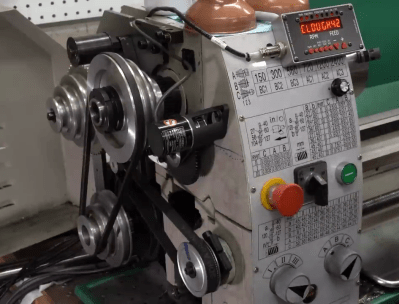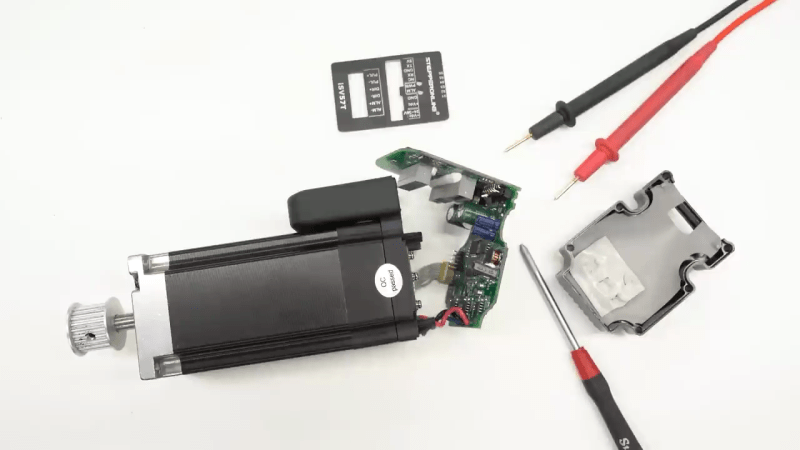The low-cost servo motor in [Clough42]’s lathe’s electronic leadscrew bit the dust recently, and he did a great job documenting his repair attempts ( see video below the break ). When starting the project a few years ago, he studied a variety of candidate motors, including a ClearPath servo motor from Teknic’s “Stepper Killer” family. While that motor was well suited, [Clough42] picked a significantly lower-cost servo motor from China which he dubbed the “Stepper Killer Killer”.
He does a very thorough post-mortem of the motor’s integrated servo controller, checking the circuits and connections on the interface PCB first. Not finding any obvious problem, he proceeds to the main PCB which contains the microcontroller, motor driver transistors, and power supplies. There is no visible damage, but a check of the logic power supply shows 1.65V where 3.3V is expected. Looking at the board with a smart-phone mounted IR camera, he quickly finds the bad news — the microcontroller has shorted out.
 He doesn’t have access to the control firmware on the STM32, so even if he replaced the MCU, he has no way to make the motor functional again. After briefly considering the ClearPath Stepper Killer once more, he decides to simply replace the motor with another identical one. The Chinese motor is not only cheaper, but the changes he’d have to make to the motor brackets and control software factor significantly in his decision as well.
He doesn’t have access to the control firmware on the STM32, so even if he replaced the MCU, he has no way to make the motor functional again. After briefly considering the ClearPath Stepper Killer once more, he decides to simply replace the motor with another identical one. The Chinese motor is not only cheaper, but the changes he’d have to make to the motor brackets and control software factor significantly in his decision as well.
As one viewer commented, all might not be lost. If the STM32 firmware can be extracted from the new motor, there’s still a chance the old one can be salvaged. We first wrote about this lathe electric leadscrew project a few years ago, and [Clough42] has since made an entire series documenting the modifications and the decisions he made along the way.
















(Didn’t watch the video) So the first motor was a cheap purchase, and now the replacement is a cheap purchase. If the quality motor was even twice the price of the original cheap one you’d still be ahead of the game by now.
Sure, if they had bought a cheap motor and had it blow up then it’s valid to suggest spending more on a good motor that won’t. But it’s the *expensive* motor that blew up.
Not that you’d have known that, since you explicitly state you didn’t bother actually checking the sources.
Blah, now I’m guilty of the very thing I complained about. IGNORE ME.
You’re fine, thanks for clarifying. I usually watch all the videos but was in a rush tonight and now I have egg on my face.
if was the $99 motor that blew up, and he bought a new $99 motor, the clearpath alternative is >$400
it’s only cheaper if your time is worth nothing
I recognized his channel name and photo from his thingiverse account waaay back. We both had a semi-obscure MakerFarm i3v back in the day, and his upgrades were neat. I didn’t know he had a youtube channel, I’ll be following.
The youtube comment about possible short-circuit in capacitor on the 1.2V Vcore rail heating up integrated regulator is valid also.
Always with the failed caps, I swear. I just replaced a bad MLCC on a friend’s garage door opener.
I bought James’s kit a while ago and I’m just now in the process of installing it on my mini lathe. I’m using the closed loop stepper that was his third choice. There are some other ELS projects out there that are intriguing, but I plan on going full CNC eventually and this was a good open source starting point to get the spindle position and have a stepper already in place for the carriage.
There’s also Nano ELS [1]which might be a bit easier to setup and has more features. I built my own [2] version that’s dual axis and more full featured similar to Rocketronics ELS but that’s a tad more complicated & pricier though it does have closed loop linear motion option if you have an optical scale.
[1] https://github.com/kachurovskiy/nanoels
[2] https://github.com/hobbymachinist/els
How does the mentioned ST-Link firmware-dump bug work?